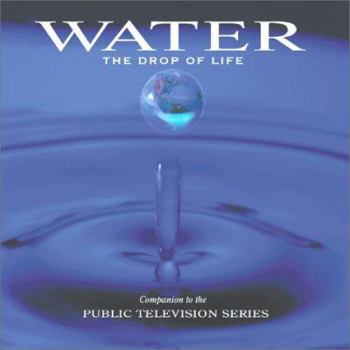Water: The Drop of Life
Attempts to show how important is the world's fresh water supply, and how vulnerable. Addresses Australia, Africa, England and the US. This description may be from another edition of this product.
Format:Hardcover
Language:English
ISBN:1559717823
ISBN13:9781559717823
Release Date:January 2001
Publisher:Northword Press
Length:144 Pages
Weight:2.60 lbs.
Dimensions:0.7" x 11.2" x 11.1"
Age Range:12 years and up
Grade Range:Grade 7 and higher
Customer Reviews
3 ratings
The gift of water
Published by Thriftbooks.com User , 23 years ago
"Water: The Drop Of Life", is a companion book to the PBS series about water. The book is well written, and also stands well on it's own describing water usage in much of the world today. Water is a precious resource, but it is often not thought of in that way. Instead, water is often wasted and misused in many places. Contaminated water is also the source of great tragedy and suffering. Millions of people die every year from water borne diseases, including a huge number of children. This book tells the story of the consequences of bad water, and of ongoing efforts to improve the quality of water everywhere. With continuing increases in the world's population, water resources are being strained as never before. Something has to be done on a worldwide scale, or there is going to be a massive water crisis in this century. This book helps to bring the problem into clear focus, and provides possible solutions for the future. It helps us to understand one of nature's greatest gifts; a gift that is far too often taken for granted. This book provides valuable insights and information into the many uses of water.
Appreciated. Comment on infant baptism is inappropriate.
Published by Thriftbooks.com User , 23 years ago
I am trying to keep current of water supply and quality issues and found this book, though not a gusher of information, perhaps because only 143 pages, refreshing. I believe I hadn't previously known about "DRiWATER," (pp.136-137), a gel which, as it is slowly eaten by soil microbes, slowly releases water to the soil. I had previously read of fog catchers (pp. 42-43), but the photographs really impressed me with the utter simplicity of the technology. Two things annoyed me bit. First, the photographs should be captioned to identify the location and perhaps give more detail about the scenes. Second, the author seems to have some theological preoccupations. This might seem overly sensitive, but on p. 109, he wrote: "...the Roman aqueducts were not infallible." I've no problem with that mildly witty diction. But on p. 31, we are told that "[t]he practice of infant baptism did not become a normal practice until the fifth century, and there is still a debate today as to whether or not this constitutes a proper baptism." While I have elsewhere encountered a perhaps respectable argument against infant baptism, I remain convinced that it is better to baptise infants than to defer their baptism. I believe infant baptism harmonizes better with the biblical data. I understand that infant baptism was widespread even in the sub-apostolic era (first and second centuries) without criticism, and that even though he was baptised as an adult, St. Augustine (354-430) reported that infant baptism was an apostolic teaching. The author seems to have pulled the fifth century out of thin air for the establishment of the normalcy of infant baptism. Why commentary on infant baptism is dropped into a short book on water, I don't know.
Water, The Drop of Life by Peter Swanson
Published by Thriftbooks.com User , 23 years ago
This book is a companion to the PBS series by the same name. To date, the program has not been available in our area but the book has enhanced my desire to see the program. The book describes water issues throughout the world in words and pictures. I was left with the desire to conserve water in my daily life. The book certainly makes it clear that we have a problem with water now that will get worse in the future. We must work to protect this vital resource for future generations. Water, The Drop of Life is a book I would recommend to everyone.






